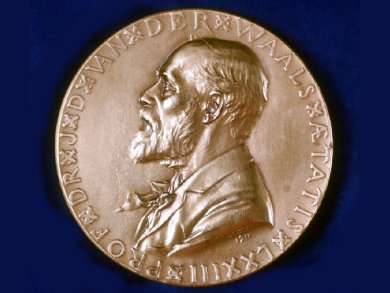The Nobel Prizes will be formally awarded this afternoon at Stockholm Concert Hall, Sweden. The Nobel Prize in Chemistry will be shared by Richard F. Heck, Ei-ichi Negishi and Akira Suzuki, while the Physics Prize will be awarded to Andre Geim and Konstantin Novoselov for their work on graphene.
Since the announcement of the prizes in October, there has been controversy over the physics prize. The Nobel Committee awarded Geim and Novoselov for “groundbreaking experiments regarding the two-dimensional material graphene”. However, the document issued by the Nobel Commitee for Physics to explain its awarding is reported to have contained several errors that raised questions about the decision. Among them, was data cited from a 2004 paper of the prize winners showing the electronic properties of graphene, yet the data actually related to thin sections of graphite, which has different electronic properties. According to Walter de Heer, Georgia Institute of Technology, Atlanta, USA, Geim and Novoselov did not report measurements on single-layer graphene until 2005.
In a letter to the Nobel Committee, de Heer raises questions over the downplaying of other contributions to the field, such as work by Hanns-Peter Boehm, Ludwig-Maximilians-University, Germany, who coined the term graphene.
The Nobel committee’s document stated graphene-like structures were known in the 1960s, but there were experimental difficulties that led to doubts about its practical feasibility. It referenced several seminal papers from the 60s, including Boehm’s 1962 paper, but none of the referenced papers mentioned experimental difficulties or expressed any doubts as to graphene’s practicality.
The work of Philip Kim, Columbia University, USA, is also considered to be downplayed as his 2005 paper on the quantum Hall effect and Berry’s phase in graphene appeared back-to-back with that of Geim and Novoselov, which reported measurements on single layer graphene. Many think Kim should have shared the prize.
Despite these criticisms the Nobel Committee stands by its decision and decision process and has since amended the web version of the document on the scientific background of graphene.
► Read about graphene from authors like Boehm or Ruoff:
- Graphene—How a Laboratory Curiosity Suddenly Became Extremely Interesting
H.-P. Boehm,
Angew. Chem. Int. Ed. 2010, 49(49), 9332—9335.
DOI: 10.1002/anie.201004096 - From Conception to Realization: An Historial Account of Graphene and Some Perspectives for Its Future
D. R. Dreyer, R. S. Ruoff, C. W. Bielawski,
Angew. Chem. Int. Ed. 2010, 49(49), 9336—9344.
DOI: 10.1002/anie.201003024
► Nature article summarizing Walter de Heer’s issues
- Nobel document triggers debate
E. S. Reich,
Nature 2010, 468, 486.
DOI: 10.1038/468486a
► Nobel Committee for Physics document to explain its awarding




